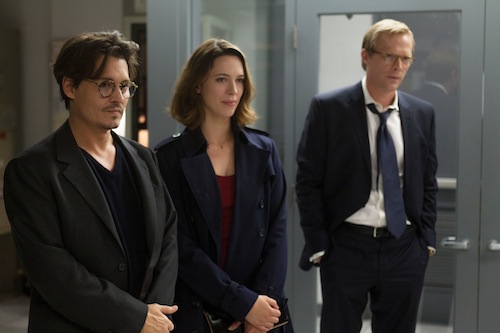With rapid technological advances, does society begin to lose all that makes it human? This is the question that the new film “Transcendence” raises. Dr. Will Caster (Johnny Depp, “Pirates of the Caribbean”) and his wife Evelyn (Rebecca Hall, “The Prestige”) are forced to make some difficult decisions after Will is attacked by an anti-technology terrorist group, leaving him with weeks to live as radiation poisons his body. The couple had been working on an artificial intelligence (AI) computer, which the two naively see as the solution to their problems; Evelyn uploads Will’s consciousness and brain to a computer before his death.
“Transcendence” opens in the year 2019, where the world has lost all electronic power. People are dirty, desperately searching for edible foods, relying on themselves to acquire food. One particularly striking moment is the camera panning over new uses of technology: A keyboard is used as a doorstop, while iPods and mobile phones are littered in the streets like trash. This was an innovative and exciting start to the film, but things start to go downhill from there. Max Waters (Paul Bettany, “A Beautiful Mind”) voices over the setting of the scene, talking about his friendship with the Casters.
The film then jumps back five years, to a time when a terrorist group called RIFT simultaneously attacks AI labs—one of these attacks is against Will. He is shot, but the wound appears to not be fatal, so he continues consulting with Agent Buchanan (Cillian Murphy, “Inception”), a government official relying on the only AI lab still at work, and Joseph Tagger (Morgan Freeman, “The Shawshank Redemption”), the only survivor and head of one of the attacked AI labs. But all is not well with Caster, as partway through the consult, he becomes ill and later discovers the radiation destroying his body. Evelyn searches for any way she can save Will, eventually choosing to upload his consciousness, against the suggestion of Waters. The process appears to work, but the computer/Will hybrid begins asking to be connected to the Internet, which Evelyn naively does. All sorts of problems break loose across the Internet, while Will also develops and enhances all nanotechnology, which gives him the capability to take human form.
Honestly, the plot is pretty implausible. The concept of one’s ability to simply upload a sentient consciousness to a piece of metal is absolutely absurd and not really ever explained. If one is able to completely suspend disbelief, the film can continue being interesting, though it does drag on in the center of the film. Will has already been uploaded to the Internet, but “Transcendence” continues plodding along as the AI system takes ages to actually do things. The RIFT terrorists who had been so important at the beginning of the film are completely forgotten about until the beginnings of a standoff start to occur. The only real storylines are given to Will and Evelyn, whose story is actually not the most interesting part of the film. If focus had been more evenly distributed to RIFT member Bree (Kate Mara, “House of Cards”) or even Buchanan and Tagger, “Transcendence” might have been able to better hold its audience’s attention.
Just because the Will and Evelyn storyline is not that interesting does not mean the actors did not do well with what they could. Depp, who always does fantastically with his characters, was an excellent Will. Yet surprisingly, his best performance is done purely through voice, when he speaks through humans controlled by nanotechnology. His tone emanating out of another’s mouth is both chilling and captivating. Hall and Bettany would probably be considered the best actors of the film though. Hall does an excellent struggling-partner role, torn between her love and her humanity, while Bettany portrays the scientist confused by his previous conceptions and the path to the dark side laid out before him.
Though the film contains many logical flaws, the acting and excellent CGI will definitely be interesting enough to the casual viewer. The small details seem to be the best part of the film, including the aforementioned interesting uses of archaic tech as well as the costume choices for Evelyn’s character. She continually wears black and white, like the colors of a computer’s code on a screen, when she supports AI Will—yet by the end of the film, her white shirt has been dirtied and bloodied, a symbol of humanity. If one is searching for a film to transcend the many logical fallacies in most of today’s films, however, this one should probably be avoided.











